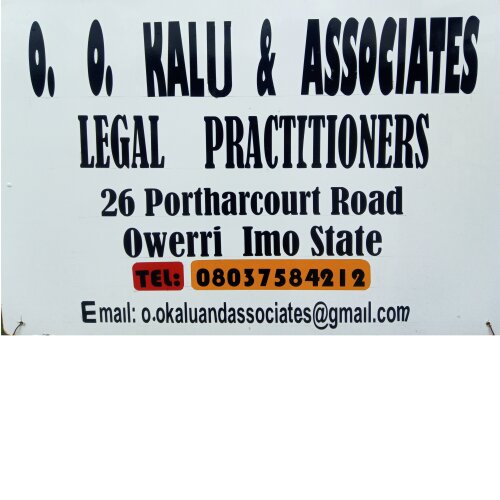Best Landlord & Tenant Lawyers in Owerri
Share your needs with us, get contacted by law firms.
Free. Takes 2 min.
Free Guide to Hiring a Real Estate Lawyer
List of the best lawyers in Owerri, Nigeria
Nigeria Landlord & Tenant Legal Questions answered by Lawyers
Browse our 27 legal questions about Landlord & Tenant in Nigeria and read the lawyer answers, or ask your own questions for free.
- About rent increament
- I was given 2 months and 28 days notice of increament of rent , I refused to pay and I was given 7days quit notice , my rent was increased by 50%
-
Lawyer answer by CO-dunni Law Solicitors
Although this increase is unconscionable, the 7days notice is valid if your rent has expired. Unless you have an alternative arrangement for accommodation. I suggest you find go and negotiate with your Landlord.
Read full answer - My house rent is expiring on march 28 next year and my landlord gave me quick notice to vacate the property on march 28 . My question is by Imo state Nigeria law is he not supposed to give me time to vacate to vacate after my rent is due
- My house rent is expiring on march 28 next year and my landlord gave me quick notice to vacate the property on march 28 . My question is by Imo state Nigeria law is he not supposed to give me time to vacate to vacate after my rent is due
-
Lawyer answer by CO-dunni Law Solicitors
There are several gaps to your question, first you did not mention the date on the Notice, another you did not mention the type of tenancy, whether it is a yearly Tenancy or a bi-annual Tenancy. The Notice to Quit...
Read full answer - I moved into a self-contained apartment in October 2024, and I paid one year's rent. My landlord issued a notice to quit to me on 23rd July 2025. What does the law say about the 3-month notice?
- I want to know if I should insist on a six-month notice or if I should leave on or before 23rd October.I moved into a self-contained apartment in October 2024, and I paid one year's rent. My landlord issued a notice to quit to me on 23rd July 2025. What... Read more →
-
Lawyer answer by Remedium Reel Attorneys
What would generally determine whether the 3 months notice is if there's a written agreement between you and the landlord. (1) If the agreement spells out that you're entitled to 3 months notice, it's valid. (2) If the agreement is...
Read full answer
About Landlord & Tenant Law in Owerri, Nigeria
Landlord & Tenant law in Owerri, Nigeria governs the legal relationship between landlords and their tenants. It sets out the rights and responsibilities of both parties, and aims to ensure fair and harmonious rental agreements.
Why You May Need a Lawyer
Engaging a lawyer can be helpful in several situations related to Landlord & Tenant matters. Some common reasons why you may need a lawyer include:
- Disputes over eviction or wrongful termination of tenancy
- Unfair rent increases or illegal charges
- Damages or repairs disputes
- Breach of contract by either party
- Negotiating and reviewing rental agreements
Local Laws Overview
Owerri, Nigeria adheres to the Lagos Tenancy Law, which governs Landlord & Tenant relationships in the state. Here are some key aspects of the local laws that are particularly relevant:
- Security Deposit: Landlords may require tenants to provide a security deposit, but it must not exceed six months' rent.
- Rent Payment: Rent is generally paid monthly in advance.
- Eviction Process: Evicting a tenant requires a court order after providing a written notice stating the grounds for eviction.
- Repairs and Maintenance: Landlords are responsible for maintaining a safe and habitable living environment for tenants.
- Dispute Resolution: Disputes can be resolved through negotiation, mediation, or by filing a case in court.
Frequently Asked Questions
1. Can a landlord increase the rent arbitrarily?
No, under the Lagos Tenancy Law, rent increases must be reasonable and cannot exceed ten percent annually or once every two years, depending on the length of the tenancy agreement.
2. Can a landlord evict a tenant without a court order?
No, a landlord cannot evict a tenant without obtaining a court order, regardless of the circumstances. Proper legal procedures must be followed.
3. Can a tenant withhold rent for necessary repairs?
If the landlord neglects to carry out necessary repairs, the tenant may be entitled to withhold rent until the issues are resolved. However, it is advisable to seek legal advice before taking such action.
4. Can a landlord enter the rental property without permission?
No, a landlord should not enter the rental property without the tenant's permission, except in emergency situations. Tenants have the right to privacy and peaceful possession of the property.
5. What should I do if I have a dispute with my landlord or tenant?
If you have a dispute with your landlord or tenant, it is recommended to initially try to resolve the issue through communication and negotiation. If unsuccessful, you can consider seeking mediation services or consult with a lawyer for legal advice.
Additional Resources
Below are some resources, governmental bodies, and organizations that can be helpful for someone seeking legal advice related to Landlord & Tenant matters in Owerri, Nigeria:
- Nigerian Bar Association - Owerri Branch: http://owerri.nbabar.org
- Legal Aid Council of Nigeria: +234 703 594 0341
- Owerri State High Court: Contact the local court registry for assistance
Next Steps
If you require legal assistance in Landlord & Tenant matters in Owerri, Nigeria, it is advisable to consult with a licensed lawyer experienced in this area of law. They can guide you through the specific details of your situation and provide appropriate legal advice.
Lawzana helps you find the best lawyers and law firms in Owerri through a curated and pre-screened list of qualified legal professionals. Our platform offers rankings and detailed profiles of attorneys and law firms, allowing you to compare based on practice areas, including Landlord & Tenant, experience, and client feedback.
Each profile includes a description of the firm's areas of practice, client reviews, team members and partners, year of establishment, spoken languages, office locations, contact information, social media presence, and any published articles or resources. Most firms on our platform speak English and are experienced in both local and international legal matters.
Get a quote from top-rated law firms in Owerri, Nigeria — quickly, securely, and without unnecessary hassle.
Disclaimer:
The information provided on this page is for general informational purposes only and does not constitute legal advice. While we strive to ensure the accuracy and relevance of the content, legal information may change over time, and interpretations of the law can vary. You should always consult with a qualified legal professional for advice specific to your situation.
We disclaim all liability for actions taken or not taken based on the content of this page. If you believe any information is incorrect or outdated, please contact us, and we will review and update it where appropriate.











